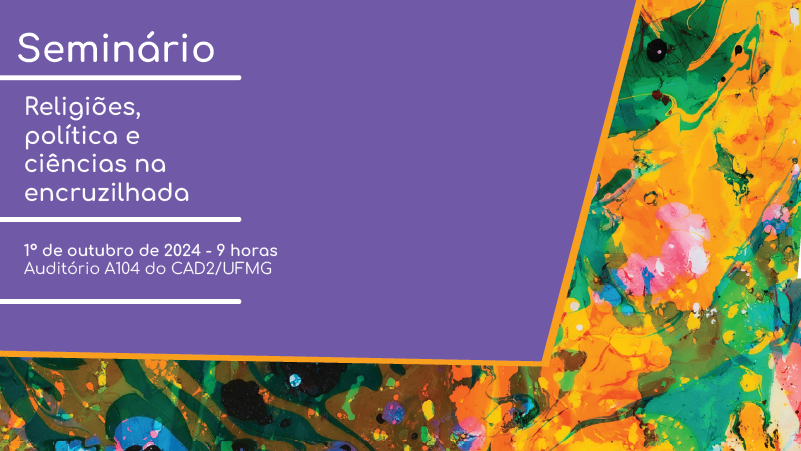
Publicity art for the Seminar Religions, politics and sciences at the crossroads (IEAT/UFMG)
Thinking about political actions, scientific knowledge and religious experiences in contemporary times is one of the proposals of the Seminar Religions, politics and sciences at the crossroads, which will be held on October 1, 2024, from 9 am to 12 pm, in Auditorium A104 of the Centro de Didactic Activities 2 at UFMG.
Participation certificates will be issued to those who register through the UFMG Event Management System (GES) and sign the attendance list on the day of the event.
The meeting will feature the participation of Gersem Baniwa, indigenous professor at the University of Brasília (UNB), Pastor Filipe Gibran, from Comuna do Reino, Isabela Dario, from the Institute for the Defense of the Rights of Afro-Brazilian Religions (IDAFRO) and Mariana Ramos from Morais, from the Postgraduate Program in Social Anthropology at the National Museum.
The event is organized by IEAT’s resident professors, Camila Nicácio and Marcelo Cattoni, from the Faculty of Law at UFMG, Marco Aurélio Prado, from the Faculty of Philosophy and Human Sciences at UFMG and Maria Inês de Almeida, from the Faculty of Arts at UFMG.
Complex themes
Religions, sciences and politics are sociocultural dimensions that historically intersect with different nuances, producing concomitant effects. Although such intersections are dynamic and change in different contexts, it is possible to state that the boundaries of these dimensions have established many controversies. Sometimes convergent and sometimes divergent, these are arenas that constitute social life and that in recent times have generated new sharing, whether in the relationship between religions and politics, often seen as cursed and dangerous, or in the relationship between religions and sciences, often understood as antagonistic fields and not as collaborative spheres.
According to the resident professors who organize the seminar, the objective of the meeting is to produce reflections on the historical, complex and contextual relationship between this knowledge, especially with regard to its impact on the demands of groups and social segments such as Afro-religious communities , LGBTQIA+ and indigenous people.